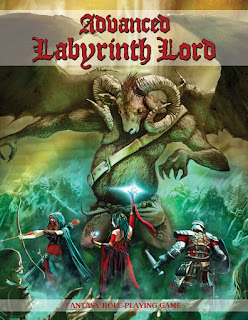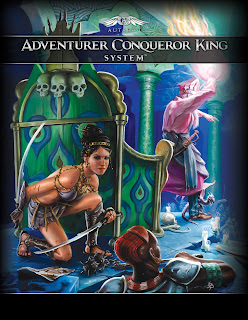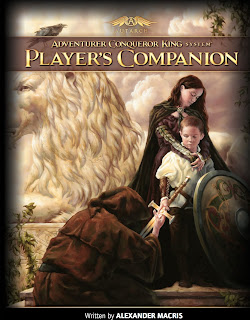I have to admit, I have OSR games I bought and don't play. I heard a feeling that there are too many OSR games, and the market needs to be straightforward and provide information about choices. But then again, this is the OSR; it all works together anyway, so there really isn't a problem.
Are there too many OSR games? I don't know. I don't really feel there are, and I have a few favorites - but it is nice to have a choice and for everyone to pick their favorite games. With the 5E world, you have many players but little choice. With the OSR, you have infinite choices and fewer players. But honestly, with 5E you are playing fantasy most of the time.
I do see a lot of niche OSR projects on Kickstarter, and my interest in them has waned just a little. I have everything I need for OSR and games closely aligned with the movement. This is not because my interest in the OSR has lessened, I just have so many OSR games that fit my interests the new Kickstarters do not seem to offer much new - except art and various book formats.
But I am sorting through my collection and boxing up games I don't play. My current best of the best OSR games that have survived multiple shelf shufflings and boxings are as follows:
Swords & Wizardry
Most of my Swords & Wizardry material are adventures played with Castles & Crusades. The base game is still my go-to OSR game since it does all the right things:
- Magic resistance mechanics
- Awesome fighters
- Less reliance on ability score modifiers
- One saving throw number (genius)
- Meant to expand and improvise rules
- Feels like AD&D Lite
Now, Labyrinth Lord and Old School Essentials are in storage - although I love those games, Swords & Wizardry does it all, feels like classic 0E plus AD&D, and does the job cleanly. I still play C&C instead because that game is more straightforward still and has way more options for the time you invest.
Old School Essentials is an incredible game if you do straight B/X, and highly recommended. Parts of it, I feel, are a little too simplified for my liking and almost too bare-bones in the class implementations. The game has a wealth of options for character types; it is just inside those options I prefer a little more detail to the classes.
Labyrinth Lord is coming out with a 2nd edition (according to the creator and his Facebook page), and I am very excited about that. Until then, I will wait and see and spend the time with other games.
The single saving throw number in this game is a genius-level simplification. It eliminates the odd and arbitrary categories and allows classes and races to specialize in an area with just a modifier (save vs. poison at a +2). It can also be used as a back-door skill system, again with modifiers if you want. You can apply ability score modifiers to a save if needed. If I play B/X and AD & D style games, I want to record as little as possible on a character sheet.
Castles & Crusades
My D&D replacement game for all editions. Is it OSR? Not really, but it does OSR so well it belongs on this list. I spent 3 hours creating a 5E character when I could have spent 3 minutes creating a C&C character and the rest of the time playing an adventure. Seriously, there was a point where I felt I was wasting my time with complex systems that did not return enough fun for the time invested.
Best of all, C&C stays out of the way as much as you want. You can play this "5E style" and do a skill check for every situation, or ignore the Siege Engine and let player actions and referee judgments run the game without dice and do things "OSR style."
Or mix the two.
Mixing classes gives you hundreds of possible multi-class combinations and can express any character you have in your head easily.
This game replaces Labyrinth Lord and Old School Essentials for me as well since this game does all the classic dungeon action without the saving throw tables, thief percentage tables, undead turning tables, and other strange charts you need to write down on your character sheet.
Save versus wands? Not in this game. Honestly, that is a save versus spells with a bonus to the roll. Not everything in the B/X era is worth keeping around. In 40 years of gaming, my group has never needed to save versus wands, yet here I am writing down save categories for situations that do not cover 100% of the hazards in a dungeon and go too granular with a few cases when a broad stroke is needed.
Adventurer Conqueror King System (ACKS)
Wait! Is a game with the save versus wands on this list?
Yes.
This game has survived many reshelving attempts and even being boxed up twice. It delivers on the realm-management promise, which very few other games do. And when you take a deeper look, the game has some deliciously gonzo and crazy treats for mages. Building a dungeon to farm monsters from and, maybe, lure adventurers to their deaths? Check. Creating mutant monster-human or monster-monster races in genetic breeding experiments? Check. Creating golems to fight for your army or crush your enemies? Check. Create an evil thief guild? Check. Make your cleric convert a population to their god? Check.
You could run a Game of Thrones game here with no problem. Good or evil kingdom. Good or evil characters tearing down the opposite side or conquering the wilds and building a new kingdom.
The game is like Civilization VI combined with a B/X roleplaying game, and it rocks.
Dungeon Crawl Classics
I have a small shrine to this game in my gaming room. Yes, there are 3E-style saving throws, thief percentage tables, and all sorts of stuff to write down. Despite all the flaws, it is clearly an S-Tier game.
The game screams in the night for you to break all your preconceptions about fantasy. Fantasy these days is this "uni-genre" and a safe, non-controversial, all-ages, talking cartoon shapes, safe for Twitter, meant to win, bucket list checkbox, fantasy fulfillment game.
And it sucks. It is a gray blob of goo that could be anything. It recycles the same old gnolls, orcs, beholders, ogres, mind flayers, dragons, displacer beasts, gelatinous cubes, cute goblins, blah, blah, blah, same old tired monsters. The spell effects are the same. The classes are the same. Everything is so stereotyped the entire game is a parody of itself.
DCC breaks the perfect box of crayons and tells you that you are never getting them back.
And you end up having more fun without all the junk and "product identity" they tell you "you can't have fun without," and you realize that trademarked and copyrighted content sucks and removes your imagination.
Every DCC module breaks the mold, and they rarely - if ever - reuse monsters or use the "old standards." The bad guy this time? Um, evil hairless and skinless rabbits were reanimated by the gas from a meteorite. What do you think they could do? What special powers do they have? You don't know, and they are not in a monster manual. How about fighting them and finding out?
And at that moment, you feel alive; you don't know what is around the next corner, what this next room hold, what that item does, and the magic and excitement of why you play role-playing games - comes back to you instantly.
Patterns?
You may notice a pattern here in my picks. They are not straight B/X implementations. They all do something unique, are the best in ease-of-use (C&C), perfectly hit all the right notes (S&W), or do something no other games do (DCC & ACKS). I am way beyond the vanilla B/X game.
Swords & Wizardry is probably the closest to B/X on my list. It earned that spot for being the most like AD&D feeling while doing all the right things. The game also pares back out-of-control ability score modifiers and puts player decisions and roleplaying ahead of stats - a refreshing change of pace.
Castles & Crusades is so easy to use, and it makes running 20 characters solo a possibility. It tosses many charts and rules, and you can play this straight from the character sheet like the classic Star Frontiers game. Everything is right there; roll and play. No other B/X games do this, and they are all super reliant on charts and writing down many lists of numbers on character sheets.
ACKS is a 4X game disguised as a B/X game.
And DCC is pure rock and roll.





































